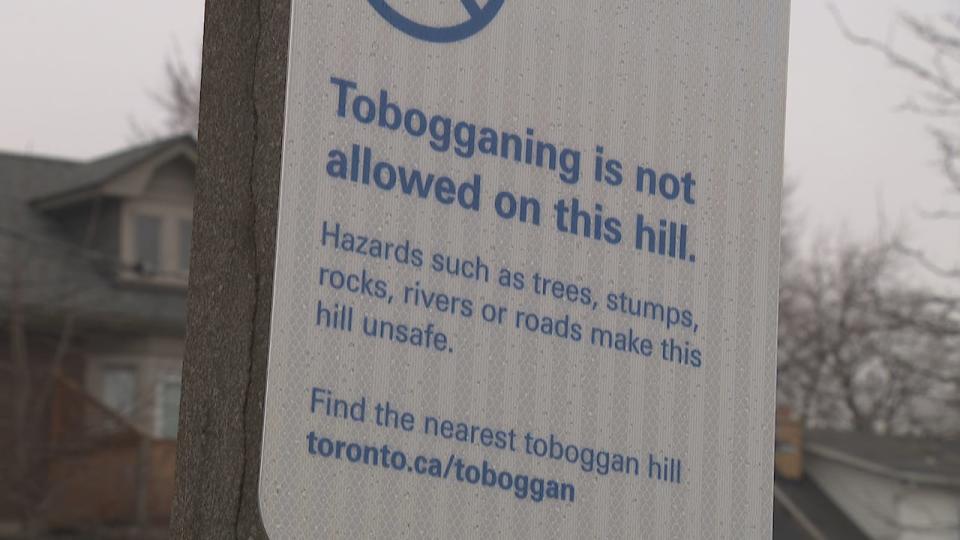Dedicated bus lanes, traffic camera changes and sleds on Toronto council agenda

UPDATE: On Tuesday, city council voted 23-3 in favour of advancing the city's RapidTO plan to develop more dedicated bus lanes on Toronto's streets.
Dedicated bus lanes, toboggans and traffic cameras are among items on Toronto city council's February agenda for debate this week.
Council begins a three-day session on Tuesday — its last meeting before debating the budget next week. Here's what you can expect to hear more about:
Dedicated bus routes
Torontonians who take the bus could soon get some relief from slow bus trips, if council votes to move ahead, in principle, with adding more bus-only lanes on some routes.
The proposed next step in the Surface Transit Network Plan, dubbed RapidTO, would have staff examine adding bus-only lanes on Finch Avenue East, Dufferin Street, Lawrence Avenue East and Steeles Avenue West. Staff are already studying other routes.
The TTC's Dufferin bus route received a mock gold award in January from a coalition of transit stakeholders for being Toronto's slowest bus route, with a peak travel time of 10.6 km/h.
Rebeena Subadar, who often uses the Dufferin bus, told members of the executive committee on Jan. 30, "It's incredibly slow with so much potential to be a fast route."
She says on a good day it takes her an hour to get from her home in Black Creek to downtown but says some days it's taken her double that.
The city says currently 70 per cent of all TTC journeys include a surface transit trip.
The staff report asks for support of the Surface Transit Network plan in principle. There are not any guaranteed timelines tied to the vote.
Councillor Alejandra Bravo, who represents a ward which includes Dufferin Street, says a dedicated bus lane would be a "powerful intervention."
"There's nothing more important than a bus in terms of access," she said.
Toboggans slide back onto agenda
Tobogganing has also slid back onto this week's council agenda, with a motion that if passed would return tobogganing to 45 hills across Toronto.

The city installed no tobogganing signs on many hills throughout the city this season. (CBC)
Signs were erected this winter season banning tobogganing due to safety concerns. The new motion, brought forward by Beaches–East York Coun. Brad Bradford and seconded by Mayor Olivia Chow would install new signs "warning about the potential risks associated with tobogganing as well as information on where to find designated tobogganing hills that are inspected or maintained by the city."
"We don't want to live in a bubble-wrapped society," said Bradford. "A tobogganing ban is just ridiculous, and frankly, it's embarrassing. We're developing the reputation of a no fun city."
The motion would also ensure city staff work with the local councillor before banning tobogganing on any hill in their ward.
The city has not seen very much snow this season. Environment Canada lists Feb. 10 as having a chance of rain showers or flurries.
Warning to red light runners, speeders
Those found to be running red lights and speeding past automated speed cameras could find it harder to fight a ticket if a motion passes.
After Nov. 1, anyone ticketed by a red light camera or automated speed enforcement camera would no longer be able to fight the fine in a provincial court. Instead, they would have to appeal to a hearing officer at a quasi-judicial city tribunal.
City staff and members of the Infrastructure and Environment Committee have recommended the change they say will allow the city to better advance Vision Zero, its road safety plan, which aims to reduce deaths and injuries on city streets.

To urge drivers to slow down, and additional 75 Automated Speed Enforcement (ASE) cameras will be installed in Toronto by 2026. But in order to accommodate those cameras, a new system to administer the tickets must be adopted, city staff say. (Michael Wilson/CBC)
Deputy Mayor Jennifer McKelvie, who chairs the group, said, "If we put this system in place, it will allow us to expand the automated speed enforcement program, which is something that council has asked for."
The city currently has nearly 300 red light cameras and council has authorized staff to increase the number of speed cameras to 150 as soon as possible.

 Yahoo News
Yahoo News 
